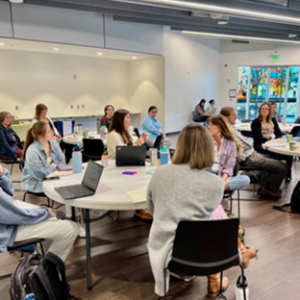UNC SRP co-convenes 2023 NC Fish Consumption Advisory Forum

Participants in the 2023 NC Fish Forum engage in discussion during a breakout session. (Photo credit: Lacey Brown, NC State University)
In October 2023, Superfund Research Programs (SRPs) from the University of North Carolina (UNC), North Carolina State University, and Duke University co-convened the 2023 Fish Consumption Advisory Forum. At the forum, participants discussed the process, barriers, and successes associated with establishing and communicating fish consumption advisories in North Carolina.
UNC SRP helped lead the first NC Fish Forum in March 2019, which resulted in the white paper Engaging Stakeholders to Improve Fish Consumption Advisory Communication: A Report From The 2019 North Carolina Fish Forum. At this forum, participants included representatives of the North Carolina Wildlife Resources Commission, environmental non-profits, community advocates, state and local health officials and NIEHS. The collaborative discussion from the 2023 workshop will inform an update of the 2019 report, with new recommendations for agencies and organizations working on fish consumption advisories in the state.
Establishing Fish Consumption Advisories
Dr. Virginia Guidry, Kennedy Holt, Ashley Graham, and Dr. Zack Moore with the North Carolina Department of Health and Human Services shared information on their current procedures for establishing advisories. Participants discussed current constraints (such as funding) that limit the number of fish that can be tested for contaminants. They noted that partnerships and collaboration with the community may be key in collecting enough fish from enough locations. Additionally, they recognized that securing additional funding for these efforts is a political process, dependent on the North Carolina General Assembly.
Effective Communication of advisories
Forum participants also discussed the challenges in communicating fish consumption advisories. A recent publication by UNC SRP Community Engagement Core leader, Dr. Kathleen Gray, about the role of informal educators in advisory communication, reported that limits in educators’ understanding, organizational constraints, and interaction with fishers impacted their communications. Challenges to communication discussed at the forum included educational attainment of fishers and fish consumers, accessibility of information, and language barriers, among others.
Participants discussed the need to involve communities impacted by advisories in advisory communications. They recognized that a variety of communication efforts will be needed to reach the many people who consume fish caught in North Carolina waterways, especially those in low-income and indigenous populations. The importance of transparency in how advisories are set and associated limitations was also discussed.
